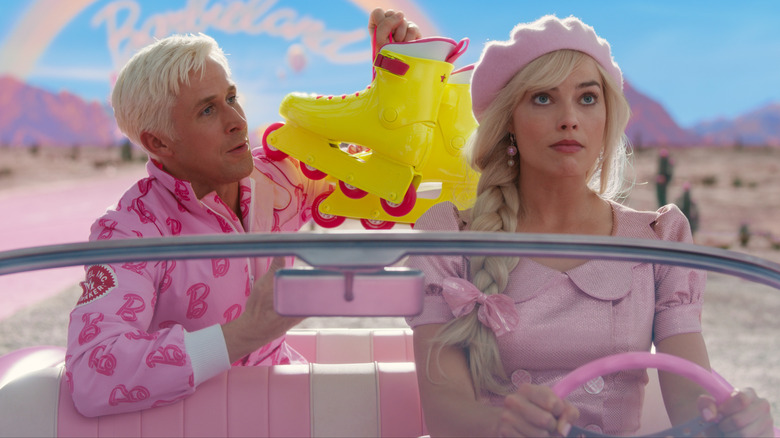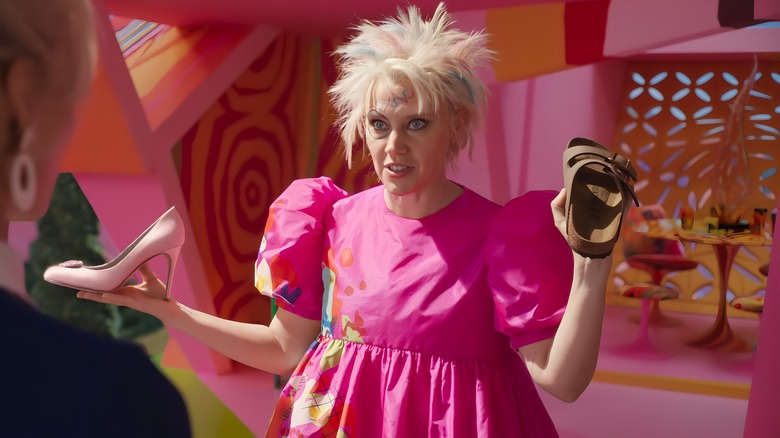Barbie Was Just Banned In Two More Countries - Here's Why
It seems that two additional parts of the world will not be seeing Greta Gerwig's "Barbie" movie. The Warner Bros. film has now been banned in the countries of Kuwait and Lebanon due to political officials' disapproval of certain elements of the film's content.
In a press release from the Kuwaiti Ministry of Information's Committee on Cinematic Censorship obtained by the Kuwait News Agency, the organization stated that both "Barbie" and the horror film "Talk to Me" will be banned in Kuwait due to the films running counter to the country's ethical standards and social traditions. "The Committee noted that both movies promulgate ideas and beliefs that are alien to the Kuwaiti society and public order," Committee head Lafy Al-Subei'e said.
While Kuwait's stance on why exactly "Barbie" was banned is rather vague, Lebanon has been much more explicit in its reasoning. According to a report from The Associated Press, Culture Minister of Lebanon Mohhammad Mortada moved to ban the film under the opinion that it "contradicts values of faith and morality" and "promotes homosexuality and sexual transformation." Notably, "Barbie" does not feature any major characters who are explicitly confirmed to be gay.
Barbie is still seeing a blanket release in the Middle East
While "Barbie" may not be seeing a release in Kuwait and Lebanon, the movie is still moving forward with plans for distribution in other parts of the Middle East, including countries like Saudi Arabia, the United Arab Emirates, and Egypt. However, the path to a release in these territories hasn't exactly been smooth either.
In a report from Variety at the beginning of August, the outlet indicated that Warner Bros. and its foreign film distribution partners had delayed the release of "Barbie" in Middle East territories to the end of August. Per an alleged source with knowledge of the matter, the delay was made to give time for Warner Bros. to negotiate with various countries' media officials regarding their requests to edit or censor certain LGBTQ+-centric dialogue contained within "Barbie."
While the situation regarding the release of "Barbie" in Middle Eastern countries seemed to be teetering on the verge of a complete breakdown — as was apparently the case with Lebanon and Kuwait — it appears that Warner Bros. and various other countries have reached unspecified agreements that have allowed the movie to see a release in most territories. A week after its initial report on the delay, Variety noted that "Barbie" would indeed see a release in Saudi Arabia, among other countries, with the delay itself being considerably shortened.
Barbie was also banned in Vietnam and the Philippines
Before "Barbie" saw a ban in Kuwait and Lebanon, the film received a ban in both the territories of Vietnam and the Philippines for a very different reason. Per Variety, the countries have banned "Barbie" due to one brief scene in which a map — the one Kate McKinnon's Weird Barbie shows to Margot Robbie's Barbie — includes a visual indicator approximating the "nine dash line" in the South China Sea.
China, Vietnam, and other countries have long clashed over which country has territorial sovereignty over the South China Sea. The "nine dash line" represents the boundaries of the large swath of territory that China has claimed ownership over in the region — a claim that other countries in the area like Vietnam and the Philippines vehemently oppose. The inclusion of a crude depiction of the "nine dash line" in "Barbie" led Vietnam and the Philippines to ban the film for ostensibly taking a stance in support of China's claims.
Warner Bros. has held fast that the map in "Barbie" is not intended to present any sort of underlying geopolitical message. "The map in Barbie Land is a child-like crayon drawing," a spokesperson for the company said in a statement to Variety. "The doodles depict Barbie's make-believe journey from Barbie Land to the 'real world.' It was not intended to make any type of statement."


